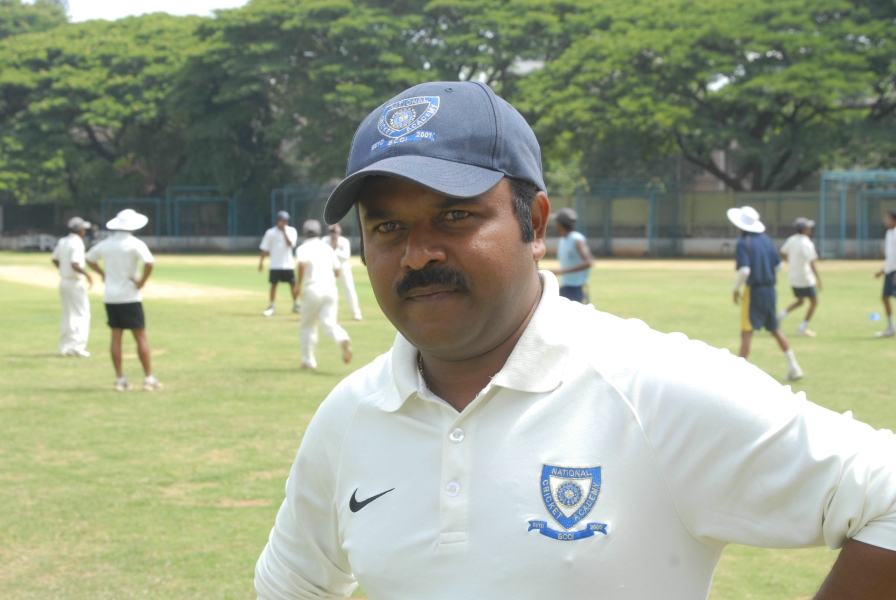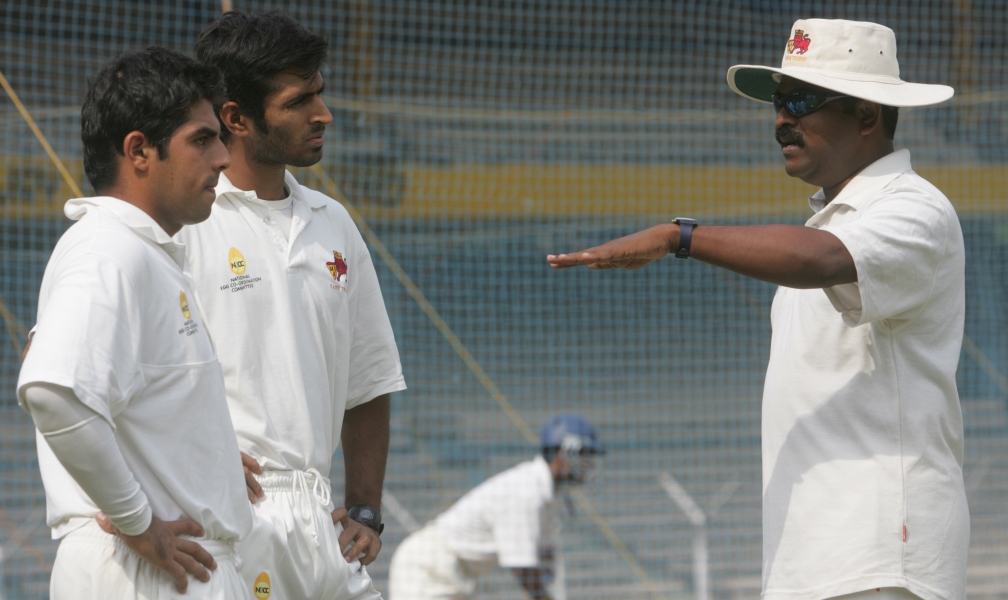 INTERVIEW
INTERVIEWKnown to have a keen eye for talent, and one who has worked with the likes of Shreyas, Rishabh Pant among others, as part of his talent-scouting role in the IPL, Pravin Amre is well-respected in cricketing circles. In an exclusive interview, he shares his knowledge on a number of things. Excerpts:
Anil Kumble has started the debate again by saying he is surprised by the absence of Indian head coaches in the IPL. What is your reaction?
Well I think a person like Anil who has played so much cricket and someone who himself has been part of the IPL since the first edition, says (it is a big thing). Not only as a player but also as a coach of the Indian team and IPL teams in the past, I think he himself has felt that Indian coaches have the potential of becoming a head coach of an IPL team. Because if seven Indians are going to play all the time in a playing XI and seven more are always there as a back-up. So it’s all the more important to get an Indian input. Those 7 players are very critical to win an IPL championship. Also, I want to mention that Indian coaches can be more useful at the auction table because of their awareness and knowledge of the local players and talents. You can look for the best winning side and match your kitty on the auction table.
You have been in IPL since almost the beginning (second season with MI as batting coach) until last year with Delhi capitals as their head scout talent. How has your experience been? And why didn’t you graduate to become a head coach?
When I started Shaun Pollock was head coach of Mumbai Indians in 2009 and later I came to Delhi. I joined when Gary Kirsten was there and when I finished it was Ricky Ponting (who was leading the set-up). It is not just about handling Indian players only but also players from all over the world are coming and getting their respect is very crucial for IPL franchises, so they make sure that the balance is proper (in terms of), foreign players should also respect the foreign coach. For me, I had a great time with Ricky. I was there for an important phase of Delhi Capitals who had not qualified for the playoffs for 8 years. I think we were part of that journey.
We were so down and then we started to come up and I want to say that my role was also important because as a talent head I was singularly entrusted with picking Indian talents. And I think the best part was that having the confidence of franchise owners as well as the head coach. When I was with DC I got the support of Kiran Ganpathi that is the reason why he backed uncapped Indian players like Shreyas Iyer, Rishabh Pant and Prithvi Shaw. When it comes to head coach, you can’t question the caliber of someone like Ponting who himself has been such a big player, a 3-time World Cup-winning captain/player. And he has also an excellent record as a coach and for me it was great learning time to be sitting next to them in the dugout, learning how they handle the team.
Coming back to that point, I don’t think it is so easy for Indian coaches to come and go straight to the position of a head coach as there is a lot of competition for that slot. For me it has been always a passion. You mention about the second IPL and I was there until the 12th season. What I like as a coach is that I am also connected with the new generation and their thought processes. In the T20 format it is not just about technique, we see the mindset of players how they become fearless (from the beginning). You have to do so much of research before picking a player when you are in a talent hunt. For a new player (franchise) will depend on you because you will vouch for their talent.
How is talent-scouting different from coaching? John Wright is doing it for MI for almost a decade and Vijay Dahiya has replaced you at DC?
It is really a difficult process. You have to go to remote places to watch the tournaments. Especially like Syed Mushtaq Ali T20, DY Patil tournament in Mumbai or anywhere in the country where T20 leagues are happening in search of fresh talents. You don’t have great facilities at many of those stadiums and yet you have to watch every moment of the game. We know how John Wright spotted Bumrah and Pandya for MI.

Isn’t it ironical that a foreign scout like Wright did it for Bumrah and Pandya and not the many domestic coaches of India?
It is like you (are lucky to be) watching that game when the spark was there. I want to answer your question directly now that sometimes you don’t want a kind of player for a (particular) franchise. They want a pace bowler, a batsman or a wicketkeeper or something else (depending on their need). It’s like demand and supply also. A particular team requires that kind of players and they hunt for that. They will always take a list from us and then decide what they want. MI always retains their top 4 players. 60 per cent of the purse is already gone with established players and when you come to the auction, the role of a talent scout is so vital. (Getting a) Good talent at a good price is also very important.
Is it true domestic coaches like you, Sanjay Bangar, Vijay Dahiya, Lalchand Rajput etc. are not valued highly by owners as you don’t seem to possess a high-profile personality. Does that go against a hard-working coach?
Earlier we were dependent on foreign coaches for the national team as well but then came Anil, Ravi (Shastri) and Bangar. We are also making sure that Indian coaches should be there with the national team. I was always in the top four whenever there was coaching opportunities/interviews etc for the Indian team. It also depends on the panel what they think is best for the team.
Sanjay Bangar suggested that Indian coaches should also look within on the areas they need to work on. Your take on this observation?
Obviously, there are some reasons like communication skills or presentation skills. IPL is a different kind of tournament where a lot of money is involved. It is such a result-oriented tournament that as an owner you don’t want to take even one percent of chance where a team management you are (seen) as not capable of doing your job. You have to convince owners and get their trust.
Apart from IPL, Indian domestic coaches are not in great demand abroad in various leagues. Why is that so?
Robin Singh was there and so was Sridharan Sriram. It is not like Indian coaches are not there working overseas but sometimes priorities vary from individual to individual. I never applied for those vacancies as I was not a full-time coach.
You were sort of a pioneer when you started a personal batting coach for players like Suresh Raina, Ajinkya Rahane, Dinesh Karthik, Robin Uthappa and Naman Ojha. Five years down the line where is that concept now?
I like the word pioneer, I will take that! I want to be updated as far as my coaching is concerned. I was with Mumbai Ranji team as head coach for so many years and the amount of pressure was tremendous. Then it was becoming a routine work. Then I decided about personal coaching and it wasn’t by accident. I stayed at home and studied for three years with the case studies of Don Bradman to Sachin Tendulkar on what makes them click. I took notes. Did more detailed work of their batting. Why they were successful. Every cricketer wants to go the next level. I especially thank Robin Uthappa who wanted help because in India, big players don’t want to seek help. It is not accepted here. He was willing to take help despite being part of a World Cup-winning team. He was the first who wanted to invest in a coach. Someone, who wanted to surrender for the betterment of his cricket, and it was very satisfying when he got the Orange Cap (in IPL) and mentions my works on air. Obviously there is a lot of hard work done by the players but also coach’s inputs (make difference).

You have worked with Rohit, Shreyas, Virat (earlier on), Rahane. Your experiences with each individual?
Virat was there with the India A team when I had asked him to open the innings and he has mentioned how that decision (helped him in improving as a player). After losing three matches in a row we had changed the batting order and Virat as an upcoming talent remembered that. That kind of small role (played by a coach) sometimes gives you a lot of success. When I spotted Suresh Raina as an 18-year-old for Air India we made sure that we help him in all aspects.
Are you surprised that Prithvi Shaw seems to be getting distracted? What is your advice?
Not only Prithvi but a lot of young players like him, it will be a challenge for the board and associations how we handle such kind of talents. Make them understand what is good for them. We have discussed Prithvi’s case with many senior cricketers of Mumbai and they have helped him.
In coaching, you have come through the ranks from U17 to Ranji to IPL. What is your ultimate aim?
I never plan anything. It just happened. (Ramakant ) Achrekar sir felt I should take up coaching. There was one assignment where 20 boys were selected out of 500 and the likes of Shardul Thakur, Siddesh Lad and many other who went on to play for Mumbai in first-class cricket.
Any advice for young coaches?
There is a difference between a coach and a Guru as was the case with Achrekar sir. We have not done 10 percent of what they did for their love, passion and commitment for the game. I was fortunate to learn from Achrekar sir who was such a great man. Knowledge and trust of the player is very critical for any coach and then only you will enjoy the work.
What has been your coaching approach and philosophy?
Commitment is very vital whatever the job is. Don’t bother about what people are thinking. I enjoy teaching the Under-15s and also the Indian players. Bottom line is that you have to go their level. The challenge for an Indian player is how they will sustain their success. For an U15 player, how they will graduate to the next level like U17, state and so on. Best example is Shreyas Iyer who we picked as a 10-year-old and now he is leading the Delhi capitals. But I think as a coach you see more failures than success.